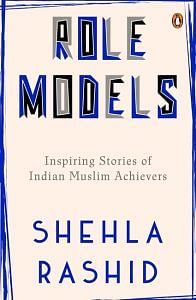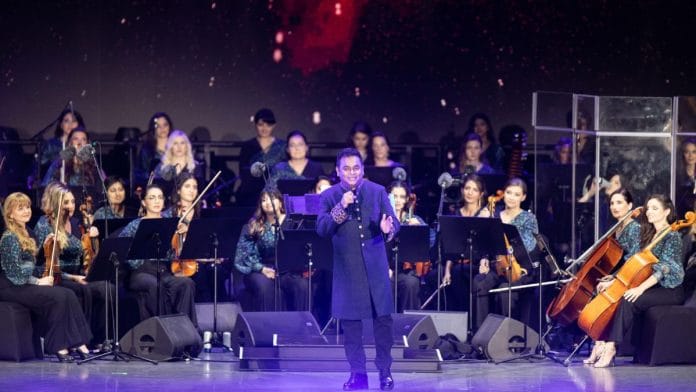We have a lot to offer the world, but it has to be offered in a format that can add value and be in dialogue with global trends. As a nation, we are finally coming of age, achieving distinction in various fields and coming out at the top in fields like sports, technology, etc. In February, 2024, India won five Grammys—three of them bagged by Ustad Zakir Hussain, including one for his fusion band Shakti.2 We are rooted in our civilizational strengths, but in dialogue with the world.
In 2020, filmmaker Shekhar Kapur invited me to Dubai and introduced me to Her Excellency Reem Al-Hashimy, who is the minister of state for international cooperation and CEO of Expo City Dubai. She asked if I could put together an all-female orchestra. I loved the idea, so we began the auditions for it, inviting musicians from all over the Middle East. For two years, I mentored fifty spectacular women from twenty-three Arab countries, and they performed at various events in the Expo Dubai 2020 (held in 2021–22) using instruments such as the oud, qanun, buzuq and the sitar. Known as the Firdaus Orchestra, it was led by Lebanese conductor Yasmina Sabbah, an exceptionally talented artist.
The Firdaus Orchestra took the Arab music scene by storm, and it is something that I’m truly proud of. It didn’t disband after Expo Dubai and has now assumed permanence in the shape of ‘Firdaus Studio by A.R. Rahman’—a world-class facility located in Al Forsan Zone, Expo City Dubai. As a young music composer a few decades ago, I lacked exposure to international music; therefore, I aim to provide it to my students right from the start. At the K.M. Music Conservatory School of Music, we bring artists from all over the world to mentor young, raw Indian talent so that they are prepared for the requirements of the global arena and are in conversation with it. We must be proud of ourselves as Indians, but we must not be oblivious to global competition and trends.
Also read: Why do Indian Muslims lack an intellectual class? For them, it’s politics first
As India finds its rightful place in the world, all of us must contribute to it by finding the missing pieces of the puzzle and putting them together. Parents have a huge role to play here in terms of encouraging kids to explore a diversity of careers beyond the traditional few. I must credit my mother for encouraging me to become a composer. I began composing music using my father’s instruments at the early age of thirteen, as a result of which I even dropped out of school. Normally, a parent would be alarmed at such a disastrous consequence, but she is a visionary who did not think of musical education or vocational education as any less than formal education.
In India, if a child picks up a guitar or an instrument, he or she is discouraged by saying that such hobbies should be pursued after finishing college. But my mother was ahead of her time. Being a composer’s wife, she understood and respected the craft, and being a spiritual person, she was able to see my path, my destiny. Rarely is art or music seen as a career path or as the main vocation, but my mother aced parenting in this regard, inculcating in me a deep respect for work, and ensuring I never had any regrets about leaving formal schooling in favour of my passion. I follow a similar approach with my children, allowing them to find their path wherever it takes them, not imposing my expectations upon them.
However, since all of my kids have shown interest in music, it is simply my job as a father to ensure that I guide them as best as possible in their chosen direction. Tomorrow, should they decide to do something different, I will be there for them as a loving parent, and I implore all Indian parents to follow a similar approach with their kids, who are already burdened by homework and societal expectations. I spent my childhood in the studio, working alongside people who were fifty to sixty years of age while I was thirteen or fourteen. I was barely eighteen when I bought my first computer in December 1984. Technology has always been an integral component of my work.
I am lucky that I got a free hand to experiment with my inheritance—my late father’s musical equipment—and doing so put me at ease and gave me a comfort with technology that does not always come naturally to people of artistic bent. More recently, we used Artificial Intelligence (AI) to recreate the voices of two deceased singers, demonstrating a fair and ethical use case for AI-generated audio technology. We sought permission from their families and duly remunerated them. Doing so has provided a template for what should be done with technology. We keep complaining about deepfakes, pointing out their ethical concerns and so on. However, whether we like it or not, the technology is already here.
So, I thought, why not demonstrate how these technologies should be used instead of complaining about misuse? Why not set a precedent for remunerating artists whose voices or images are used to generate content? We have seen the faces of actors being unethically used without permission or consent, and they are fairly helpless in the face of such incidents. However, we have set a precedent for fair and ethical use of such technologies, which can hopefully empower artists to claim remuneration, compensation or damages if someone uses their voice or face without permission. That can be the only deterrent against unethical use. Bad things can only be countered by good things. I’m not a fan of alarmist views of technology and AI, because they can never replace wisdom, knowledge and experience.
Elbert Hubbard famously said, ‘One machine can do the work of fifty ordinary men. No machine can do the work of one extraordinary man.’ Any writer who has tried out tools like ChatGPT knows that they are nothing more than a better, more improved version of Google, unable to replace even a moderately good writer. We should use such tools to assist us and speed up our work, just as we used search engines.
We can think of such tools as slaves, going by the old adage that technology is a good slave but a bad master. AI assistants can help us shorten the duration of a project. What would take three years earlier can now take three weeks. Problems begin when we allow technology to become a master, as we have to some extent with smartphones and social media. AI has its limitations, which become apparent in the simplest of tasks. If you are a seasoned craftsman or an original thinker, technology will be a mere tool for you. But if you use it as a shortcut, becoming dependent on it, you will be enslaved by it.
 This excerpt from Shehla Rashid’s ‘Role Models’ has been published with permission from Penguin Random House.
This excerpt from Shehla Rashid’s ‘Role Models’ has been published with permission from Penguin Random House.






